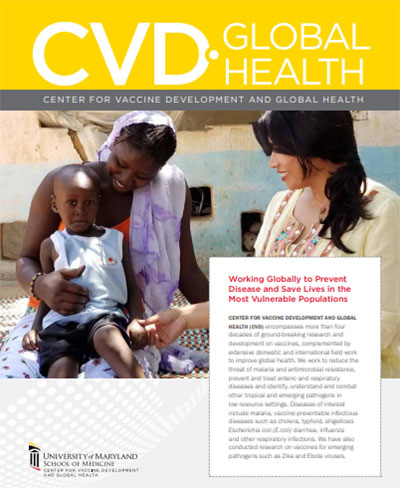Follow Us
Preventing disease and saving lives through development and delivery of vaccines
Research at the Center for Vaccine Development and Global Health focuses on infectious diseases that affect those domestically and internationally, with a focus on less-developed countries. Infections of particular interest include cholera, typhoid fever, shigellosis, and the various types of Escherichia coli that cause diarrhea. Also of interest are diseases caused by other Vibrio species, malaria, AIDS, pertussis and meningitis due to Haemophilus influenzae type b.
Faculty and staff consult with international agencies such as the World Health Organization, Pan American Health Organization, Agency for International Development and World Bank, as well as with individual governments.
We have several vaccine research and development programs designed to centralize and expand interdisciplinary efforts in translational research, with the ultimate goal of accelerating vaccine development and usage. Projects encompass development, challenge studies and vaccine trials of genetically engineered vaccine strains including influenza strains such as attenuated Salmonella Typhi and Shigella (alone or as a carrier of foreign genes), Vibrio cholerae, Enteroaggregative E. coli, Plasmodium falciparum, Salmonella Paratyphi A and B, non-typhoidal Salmonella (NTS), invasive NTS, Dengue virus, Francisella tularensis, influenza, hepatitis and Ebola.
Vaccinology is a multidisciplinary scientific and medical field that encompasses and incorporates bacteriology, virology, parasitology, immunology, molecular biology, structural biology, epidemiology, public health, clinical trials, translational medicine, pediatrics, internal medicine, biostatistics, anthropology, ethics, fermentation engineering and, as necessary, other areas of expertise.
The CVD conducts research that ranges from basic laboratory investigations of pathogens, mechanistic aspects of immunity, and construction of vaccine development through pre-clinical animal model studies, performance of early small-scale (Phase 1 and 2) clinical trials, large-scale pivotal Phase 3 efficacy trials, and post-licensure trials.
While our main research thrust has historically focused on bacterial enteric pathogens, rotavirus, and malaria, we has also worked more broadly in the areas of bacterial diseases, parasitic diseases, viral diseases, novel delivery systems, public health and vaccine policy. As a result of many of these endeavors, we have generated intellectual property available for licensing by commercial entities.
Research initiatives from laboratory to licensure
- Developed cholera vaccine licensed by FDA in 2016
- Led pivotal trials for a typhoid vaccine
- Conducted trials of the live attenuated intranasal flu vaccine and multiple pandemic flu vaccines requiring rapid implementation
- Instrumental in malaria vaccine development, maintaining a mosquito insectary, and performing controlled human malaria infection studies
- Pioneered the first clinical trial of an edible vaccine to prevent diarrhea
- Developed human infection challenge models for Shigella, diarrheagenic E. coli, and cholera

